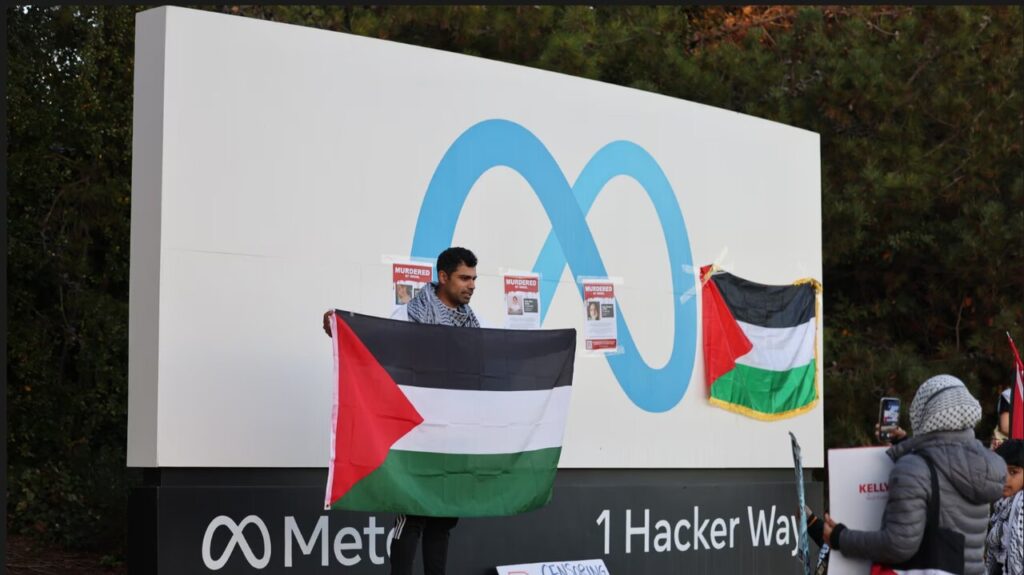Tehran – The current digital age, where social media serves as a major tool for global communication, has seen recent revelation about Israel’s efforts to block pro-Palestinian content on metaplatforms (Facebook and Instagram).
The intentional campaign to curb important narratives by Israeli authorities comes from leaked information reported by sources such as Drop Site News, Anodiden, and the Palestinian Chronicle.
On April 12, 2025, the Palestinian Chronicle live blog highlights the harsh nature of this crackdown by documenting the removal of 90,000 posts in Meta in response to Israel’s requests within a day. The statistics depict a deliberate information management strategy, along with Al Mayaden’s report on Israel’s “directly organized” efforts to curb Israeli pro-Palestinian narratives.
Israeli censorship efforts stand out because they target international conversations rather than domestic content, set them apart from other governments, and usually limit their focus to internal media.
Control mechanism: collaboration and automation
This censorship system reveals a disturbing partnership between Mehta and the Israeli regime. Meta doesn’t just follow Takedown requests. It actively promoted the Israeli government’s massive censorship campaign and provided a legal pathway to do so.
The evidence shows accomplices that outweigh mere compliance. This encourages scrutiny of meta neutrality and consistency with government agenda.
When artificial intelligence (AI) is incorporated into censorship systems, it increases reach while improving operational performance. X’s post suggests that Meta’s AI could automatically censor global criticism of Israel, eliminate human surveillance and reduce the due process for content creators. This automated system speeds up the removal of content while simultaneously creating the risk of excessive censorship that silences legitimate opposition without inspection.
The lack of transparency in how these algorithms are programmed and the criteria they use adds another layer of concern, as well as the potential bias built into the training data.
Legal and ethical implications of censorship
Legally speaking, Israel’s censorship campaign highlights serious concerns about whether censorship programs comply with international human rights law, particularly the right to freedom of expression under Article 19 of the Universal Declaration of Human Rights.
The deliberate targeting of pro-Palestinian voices as evidence of Gaza’s war crimes and genocide creates the impression that censorship aims to counteract reputational damage and manipulate public opinion about Israel while preventing accountability.
The legal decision from the International Court of Justice that Israeli actions regarding Gaza could represent genocide adds even more complexity to the ethical debate on censorship, in an attempt to hide evidence and prevent witnesses from speaking.
From an ethical perspective, we need to look into the meta of this operation in detail. As a private company, meta does not have to follow the same rules as the government. However, with such a large communication platform around the world, there is a moral obligation to stand up to freedom of speech. The company chose to place Israeli requests ahead of the rights of the users.
At the same time, they made an exception to Israeli accounts. This appears to be a double standard that undermines trust in the platform.
Israeli digital wall on meta
Israel’s censorship efforts on the meta platform have established a dangerous benchmark that threatens digital freedom.
Through the management of major technology companies, Israel has created complex digital barriers that block information flow and curb opposition with unparalleled severity. State entities and private companies use advanced technologies such as AI to establish mass surveillance and censorship as standard practices around the world beyond the Israeli-Palestinian conflict.
Disclosures regarding Meta’s support for questioning by Israeli censors emphasise the urgent need for accountability, transparency and content moderation policies that respect rights.
Social media platforms continue to provide sites that are essential for political engagement and information sharing. Therefore, digital rights and freedom of expression must remain a top priority.
To address this issue, international organizations, civil society and technology companies must take responsibility for Israel and the meta.
Actions such as transparency in content moderation policies, independent audits of AI systems, and legal challenges to out-of-territorial censorship would be a good start. At the same time, journalists and activists need to continue testing the limits of these practices.

